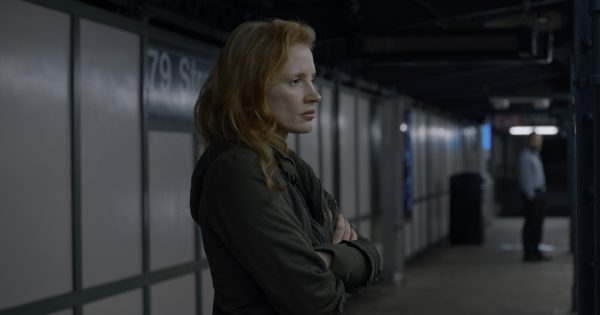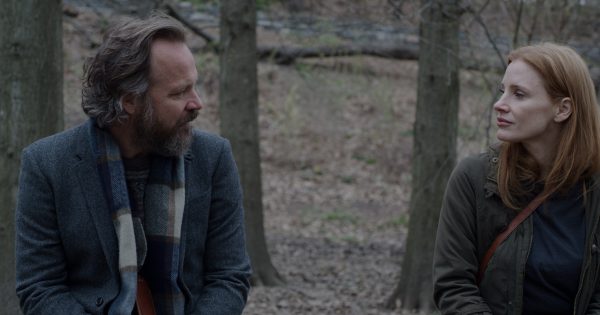
“Memory” (2023). Cast: Jessica Chastain, Peter Sarsgaard, Josh Charles, Jessica Harper, Brooke Timber, Merritt Wever, Tom Hammond, Elsie Fisher, Blake Baumgartner, Jackson Dorfmann, Alexis Rae Forlenza. Director: Michel Franco. Screenplay: Michel Franco. Web site. Trailer.
Things change one evening, however, when Sylvia goes to her high school reunion, an event she has obvious mixed feelings about attending. Once there, she feels somewhat out of place, especially when she witnesses her onetime peers celebrating their successes with various forms of imbibing that she can’t partake of for fear of undoing all the progress she’s made. Being in their company also reminds her of the difficulties she dealt with in her youth, prompting her to largely keep to herself. The stress eventually reaches a point where she feels she has to leave. But that’s not the end of the discomfort.
Upon heading home from the reunion, she finds herself being followed by one of her former classmates. Her uneasiness grows as he continues to pursue her, first on the streets, then on the subway platform and eventually to her destination. He makes no threatening moves, but his pursuit is persistent, following her right up to the front door of her apartment building. Sylvia hurriedly heads inside, slamming the door shut to prevent his entry. But, despite the safety provided her by being indoors, the stranger remains outside, eventually falling asleep and spending the night on the sidewalk. Sylvia’s creeped out by the experience, but at least he couldn’t get to her inside. Nevertheless, when morning comes, she still has to deal with the aftermath of the incident when she heads out for the day.
Once outside, Sylvia confronts the middle-aged man, whose name is Saul (Peter Sarsgard). She asks him if there’s someone she should contact on his behalf, which she soon discovers is his brother, Isaac (Josh Charles), an apparent caretaker for the troubled man. When Sylvia reaches Isaac, she learns that Saul suffers from early onset dementia, a condition that seriously affects his memory and actions. It’s so severe, in fact, that he can’t even explain why he chose to follow Sylvia home from the reunion. But, with no apparent ulterior motive, he doesn’t seem to be threatening, a development that helps put Sylvia’s mind at ease – that is, until they begin talking further about their past.
While discussing their high school days, Sylvia has an apparent epiphany about their onetime involvement. The growing comfort she had begun developing with Saul quickly evaporates when memories begin flooding back to her about the sexual abuse she believes he inflicted upon her as a teen, a revelation that awakens tremendous ire in her. The cordial arm’s-length relationship that was beginning to emerge between them vanishes in an instant when she chastises him for what she’s convinced he did to her.
However, that’s not the end of it. While discussing the situation with her sister, Olivia (Merritt Wever), Sylvia learns that the incidents she “remembers” couldn’t have happened, given that she and Saul didn’t attend their alma mater at the same time. And, when confronted with proof that their tenure didn’t overlap, Sylvia is shocked and mystified, not only at this revelation, but also that her memory is faulty on this point. Does this mean she’s suffering from dementia, too? Or is her flawed recall the result of blocked memories from her own past that she’s not ready to address?

Sylvia seeks to make amends for her erroneous accusations with Saul, a difficult but noble effort at rectifying the charges she mistakenly leveled against him. And, somewhat to her surprise, she finds him to be graciously forgiving, probably because he understands all too well what can arise from issues related to faulty memory. Consequently, they grow unexpectedly closer given the unusual commonality they share. And, at the behest of Saul’s niece, Sara (Elsie Fisher), Sylvia even takes a job as his daytime caretaker, given that she’s ostensibly the one person to whom he responds favorably. Thus begins an increasingly intimate relationship among two individuals who share a connection, one based on mutual compassion and, apparently, the ability to help heal each other where their respective conditions are concerned. Who would have thought that a bond like this could emerge in light of how things started out?
This naturally begs the question, how could a relationship like this have arisen? As their story shows, they have qualities in common, namely, those related to memory. And they prove to be crucial to the development of their connection, because they allow them to interact on a level that only they can understand. The fact that memory is involved is particularly relevant, given that memories are rooted in beliefs and that beliefs form the basis of our respective realities, a product of the conscious creation process, the philosophy that enables the manifestation of our existence. It’s unclear whether the protagonists are aware of this school of thought, but it’s also apparent that they both need to draw upon it if they ever hope for circumstances to change in their lives.
Specifically, both Sylvia and Saul have issues related to memory that need to be resolved, and what better way to make that happen than to have a loving, caring partner to help guide one another through the process, a kindred spirit who truly grasps what the other is going through and needs to reconcile in order to begin moving forward in life once again. In their own unique way, they’ve made that happen by drawing each other together to enable such an outcome. The manner in which they’ve made this happen may seem more than a little unconventional to most of us, but, considering the unconventional circumstances they have to deal with, it’s not all that surprising for this to occur in light of the specific issues they’re up against. Unique conditions call for the materialization of unique solutions, including those related to the means to make this happen.
Then there’s the question of mistaken recall. Saul is well acquainted with this, given the onset of his dementia. But that perspective, in its own singular way, is helpful to Sylvia, who suffers from a similar condition, regardless of whether or not dementia is involved. She firmly believes in a memory that doesn’t hold water, but coming to terms with that erroneous recollection is key to unlocking the truth – the actual memory that she’s willfully chosen to disbelieve and not act upon. Saul’s condition and his insights related to it are thus essential to helping Sylvia understand this for herself, something she needs to do if she wants to clear this blockage.
That concealed memory also helps to explain why Sylvia’s life has unfolded as it has to this point. Something about that hidden truth and her unwillingness to believe in its nature could very well have been too painful for her to live with, a circumstance that, in turn, led to the alcoholism and other troubling behaviors she engaged in during her youth. These conditions were so devastating to her, in fact, that they apparently kept her locked in place for a long time, necessitating a slow and arduous process to recover from them. The progress that she made through her involvement with AA certainly helped her a great deal, but, even though this enabled her to get her life back on track from a practical standpoint, it wasn’t enough to get over the beliefs that were ultimately unnerving her most.

That’s where Saul comes in. He provides “a customized solution” to help her address her own particular challenges, something that could only come about as a result of the specific beliefs she put forth to make it happen. It’s clear proof that, if we want results tailored to what we need, we must tap into beliefs that are equally tailored to what we hope to achieve.
The relationship between Sylvia and Saul is also an excellent example of co-creation at work, a collaboration between the two of them to achieve outcomes that serve them both. This pooling of energies and efforts illustrates what can arise when we work together for the betterment of one another, an initiative that can benefit each other in so many ways (and simultaneously at that). It truly is a case of slaying multiple birds with one stone – and setting us on a vastly improved course for the future, all at the same time, no matter how unusually such an endeavor might begin.
“Memory” is one of those films that takes viewers to unexpected destinations while simultaneously enlightening us to surprise insights that we can draw upon in our own lives if we choose to believe in and embrace them. Writer-director Michel Franco has created an engaging, subtle but impactful story here, one that sheds light on the power of belief behind our memories and how those recollections can shape the existence we experience as a result, for better or worse. All of this is brought to life through a skillfully crafted narrative, effectively fleshed out through the superb performances of Sarsgaard and Independent Spirit Award nominee Chastain. Admittedly, the picture’s first half could benefit from some stepped-up pacing, most notably the elimination of some sequences that are occasionally redundant and moderately tiresome. However, the intrigue and engagement ramp up significantly in the picture’s back end, some of which is ironically accomplished through deftly handled nuance rather than the overly subdued understatement more prevalent in the opening half. Clearly, this is one of those releases that requires viewers to give it some time to develop, but the payoff for doing so is worth it in the end. If nothing else, “Memory” provides us with a fresh perspective on its central theme while showing us how “like can cure like” in a psychological therapeutic process, an approach that can yield rewards beyond measure.
As this film illustrates, memory can be a funny thing. However, its underrecognized pliability can prove useful in helping us understand ourselves and our circumstances more fully and clearly. That can also work wonders in helping us clear the clutter in our consciousness that’s holding us down, holding us back and keeping us from enjoying what life genuinely has to offer us. A little effort in this area can pay big dividends – and even bigger and happier memories that we can carry forward with us into our futures.
Copyright © 2024, by Brent Marchant. All rights reserved.

No comments:
Post a Comment